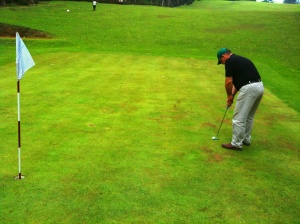
When you train you often forget the goal you are trying to reach and you lose your focus. Whether you are on the tatami or outside the dôjô, this is the quality of your focus and what you live that gives you the solution.
Do not believe the waza, they are only there to channel an idea in order to decipher the feeling that is not written. Focusing on each moment of your life guarantees success. Do not try to achieve a result as you would project your intention into a non defined future. On the contrary focus on the instant like in nakaima (middle of now) and you will be adaptable to any change happening in the instant. If you are doing a technique, you are actually seeing your victory that has not happened yet. Your tamashii (spirit, soul) is the tool allowing you to use your saino (ability) level to its best, in the utsuwa in which you are caught.
This permanent focusing of the total being (body and mind) by the use of saino konki renders possible the reaching of your goals whatever they are. The goal is not important per se but it will, like a waza, bring to your understanding, things that are not obvious at first sight.
Remember our art is to “render the invisible visible”. This is how we must see Life. And when you are able to do that, in and outside the dôjô, you are living into the rokkon shôjô.
Happiness is the only things that matter. 🙂

